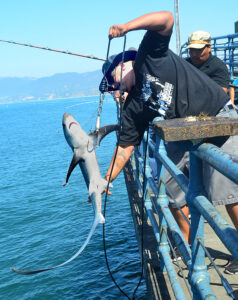
NINTH STREET — The Discovery Channel's popular Shark Week premiered on TV this Sunday, generating not just social media buzz, but also concerns about how it portrays the infamous marine predator.
Shark Week's programming and online videos aim to inspire an awe of sharks and encourage viewers to participate in shark conversation. Last year, Shark Week also partnered with three organizations that focus on shark conservation.
But the programming also features images that some say portray sharks as bloody killers. Videos on the show and its website feature, among other things, a firsthand story of a shark attack survivor, as well as footage of several shark attacks.
Officials at Heal the Bay said they are concerned Shark Week's programming perpetuates deep-seated fears people have of sharks. They are concerned these fears will make it harder to earn public support for the conservation of sharks, whose populations are declining due to human activity.
"There are hundreds of species of sharks, and only four of them have ever been recorded to have bitten human beings," said Ana Luisa Ahern, interactive campaigns manager for Heal the Bay. "They're not nearly as deadly or terrifying as the media portrays them to be."
Santa Monica-based Heal the Bay put up its own shark week blog post series in response to the Discovery Channel's programming. The blog posts include first-person accounts with sharks, bearing titles like "How I learned to love swell sharks," as well as facts about the rare chances of being attacked by a shark.
According to the International Shark Attack File at the Florida Museum of Natural History, 80 unprovoked shark attacks occurred last year in the whole world, of which seven were fatalities.
Meanwhile, experts estimate that humans kill about 100 million sharks a year in commercial fisheries.
Without sharks to regulate the marine ecosystem, populations of fish and other marine animals would grow out of control, Ahern said.
"(Sharks) are the king of the jungle in a way," she said. "They're incredibly important to the ecosystem."
editor@www.smdp.com








